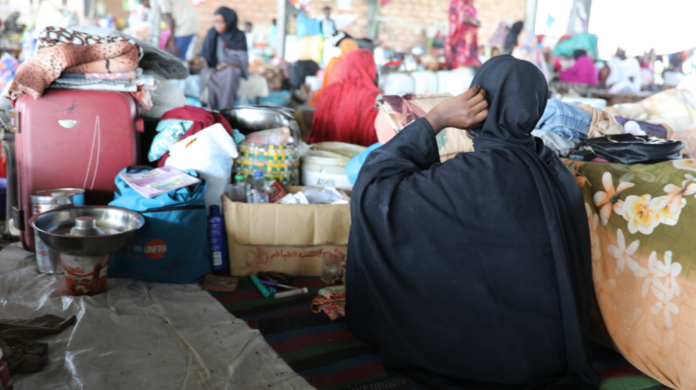GEDAREF, Sudan – “Three days after I gave birth, we heard the sounds of shelling and gunfire near our home in Singa, [Sennar State],” 26-year-old Tsabeeh told UNFPA, the United Nations sexual and reproductive health agency. “I had to grab my two children and run.”
Devastating violence – and now floods – have driven more than 8 million people from their homes since conflict erupted in Sudan in April 2023. About 670,000 are now staying in Gedaref State; Tsabeeh and her children are among them, living at a former bus station that has been converted into temporary shelter.
The shelter is basic: It has a roof, but no walls, and only blankets for residents to sleep on. Critically, however, it has served as an access point for displaced people to obtain essential reproductive health care through a UNFPA-supported mobile health team.
“When we arrived at the shelter [in Gedaref], the mobile health team provided us with much-needed medicine,” Tsabeeh said. “The midwife didn’t leave my side until she was sure I was alright.
“Now, I visit them regularly to check on my health and my newborn’s well-being.”
Compassionate care
The consequences of Sudan’s internal conflict have been particularly detrimental for women and girls. Research suggests most pregnant women and new mothers cannot obtain health care, and more than 200,000 women are on the brink of famine.
Shocking sexual violence has also been a hallmark of the crisis. “This is the scourge of war on women and girls: Extreme food insecurity, the horror of sexual violence, uncertainty and fear,” said UNFPA Executive Director Dr. Natalia Kanem.
At the displacement camp in Gedaref, UNFPA’s mobile health team is specially equipped to care for gender-based violence survivors, with providers offering both medical care and psychosocial support.
Fatima*, a 22-year-old mother from central Sudan and survivor of sexual violence, said these services have helped her to cope with her trauma. She has suffered from depression and anxiety since three armed men forced their way into her home and violated her.
“Without the mobile health team, I don’t know what I would do–they are like family to me,” she told UNFPA. “They take care of me and my baby.”
Support at every stage
Across Gedaref, six temporary health clinics have been set up to provide displaced people with essential services. UNFPA has also distributed supplies, including for emergency obstetric care and the clinical management of rape, and close to 42,000 dignity kits containing basic hygiene items across Sudan in 2024 to support women and girls navigating the humanitarian crisis.
One recipient was 12-year-old Nabaa from Sennar State. She arrived at the temporary shelter two months ago, and in that time, she got her first period.
“I was so scared and confused,” she said. “I lost my mother years ago, and I couldn’t talk to my father about this.”
But after her dad noticed blood on her clothes, he brought Nabaa to UNFPA’s mobile health team. “They gave me this bag with sanitary napkins and clothes, and taught me how to use them,” she said. “They guided me.”
The ongoing war has stripped women and girls of everything they need to survive, including food, medical support and shelter. Across Sudan, there are reports of women dying from pregnancy and childbirth-related complications, hunger and disease. The worst conditions are in the areas hardest hit by fighting and where people displaced by the conflict – and now floods – have sought refuge.
Together with partners, UNFPA has worked since the onset of the crisis to reach the most vulnerable with life-saving services, but rapid, safe and unimpeded humanitarian access across Sudan must be permitted to avert more preventable deaths.
“We call on partners to fully fund the humanitarian response plan in Sudan so that we can bring a glimmer of hope to women, girls and their families,” said Dr. Kanem. “Women and girls in Sudan have already endured too much. To bring an end to their suffering, what they need more than anything is peace.”
* Names have been changed


